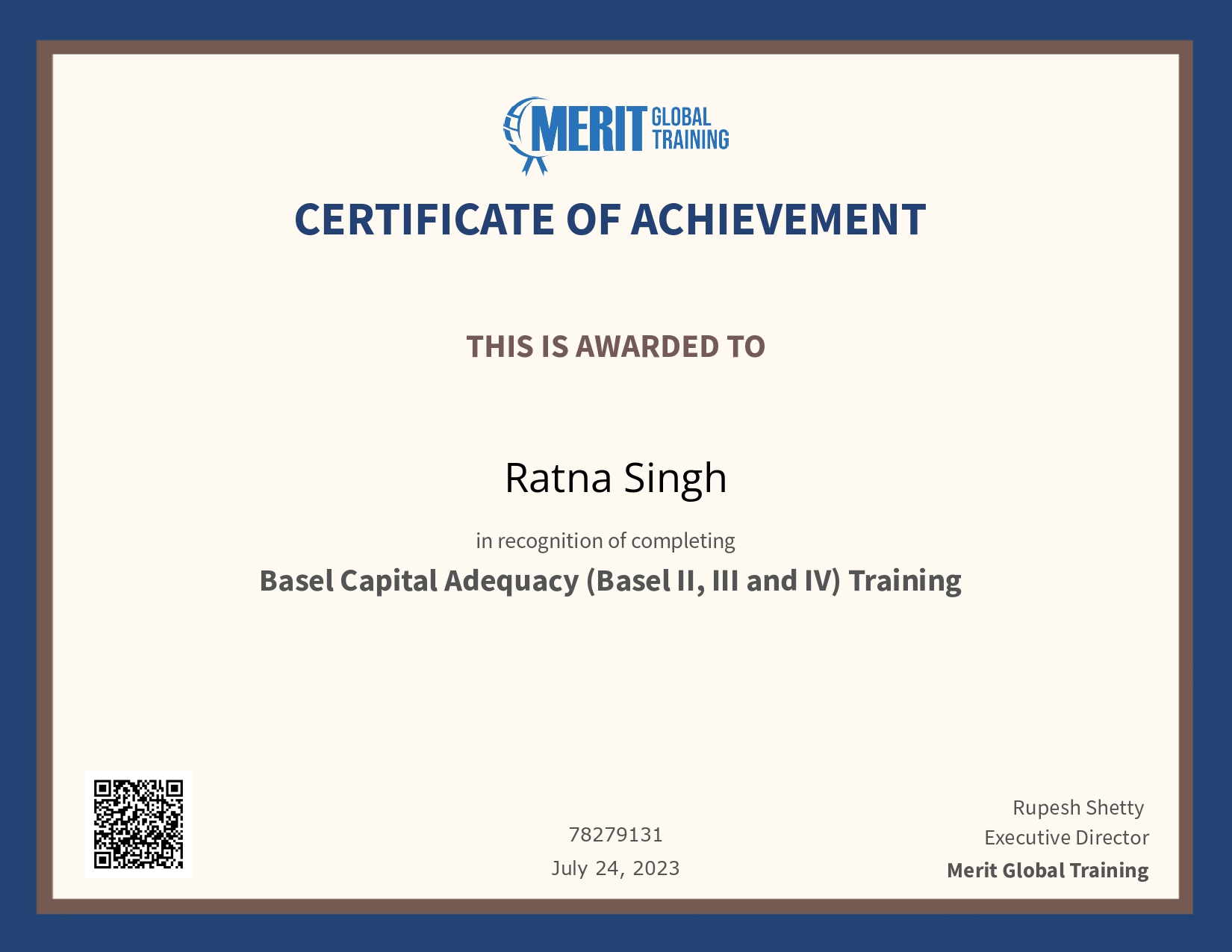
The training and capacity development programme is based on the Basel Committee for Banking Supervision (BCBS) guideline on implementation of Basel III and IV bank capital requirements/frameworks.
The hands-on training program is structured in an easily digestible format to enable individuals with no risk management/regulatory reporting experience acquire knowledge and skills required to perform effectively on Basel related capital regulatory reporting roles.
This programme ensures that participants gain theoretical insights and practical skills, preparing them for the demands of modern regulatory environments.
The course is structured into three key areas:
I attended the Comprehensive Basel training session. It was an excellent course blended with theory and practical methodology of computations of RWA. The best part is a readymade calculator that helps do all the complex analyses from the website by simply inputting data. I enjoyed the complex calculations, which were made simpler by the software.
This is a necessary/highly recommended course for any one who want to get knowledge of Basel II/ III/ IV.
The presenter not assuming we all had basis knowledge. He took his time to explain to ensure even those without prior knowledge understood. This was very helpful.
The course was good. The access to automatic calculators for the IRB approach were very useful tools for practice. Would also like to join next training on Credit risk modelling for IFRS 9.
This training is designed to:
Changes to Regulatory Capital Ratio under Basel III
Introduce participants to Basel III accord, a look at changes made to composition of capital for Credit Risk under Basel III accord.
Overview of Liquidity Risk under Basel III
Introduction of participants to Liquidity risk and examination of events that led to 2008 financial crisis and review of regulators response to the financial crisis.
Liquidity Coverage Ratio (LCR)
Overview of Liquidity Coverage Ratio, its objectives and how LCRs are derived.
Net Stable Funding Ratio (NSFR)
Overview of Net Stable Funding Ratio, it's objectives and how NSFRs are derived.
Leverage Ratio
This section highlights the importance of the leverage ratio as a non-risk based measure to ensure banks maintain sufficient equity against total exposures. It examines the leverage ratio's advantages and disadvantages, its calculation, and its implementation timeline.
Basel IV Overview
The aim of the topic is to introduce participants to Basel IV, what led to it's introduction and the implementation timeline. We also review the 3 Pillars of Basel IV accord (Minimum Capital, Supervisory Review Process & market Discipline)
Basel IV Credit Risk
The first part of the topic is to discuss the main changes to RWA calculation under the Standardised Approach. It also aims to cover changes to old and newly introduced exposure classes under Basel IV.
Basel IV: Standardised Approach
We will be looking at various risk measures that are derived under STD approach for regulatory reporting purpose and the application of Credit risk mitigant (CRM) to exposure values and/or Risk Weights where applicable.
Basel IV: Internal Ratings Based (IRB) Approach
This section introduces participants to the IRB Approach under Basel IV, detailing the Foundation and Advanced approaches. It covers how financial institutions calculate risk weights using internal estimates for PD, LGD, Maturity, EL, and EAD.
IRB Foundation Approach (IRBF)
Aim is to expose participants to RWA calculation under Foundation IRB approach. Examine the key difference between IRB and STD approach. That is, regulators allow financial institutions to use their own internal rating estimate to derive/calculate Risk Weights under IRB approach.
IRB Foundation Approach (IRBF) - Continuation
Provide breakdown of how risk components RW calculation are derived under IRBF approach.
IRB Advance Approach (IRBA)
Aim is to expose participants to RWA calculation under Foundation IRB approach. Examine the key difference between IRB and STD approach. That is, regulators allow financial institutions to use their own internal rating estimate to derive/calculate Risk Weights under IRB approach. Provide breakdown of how risk components RW calculation are derived under IRBF approach.
Basel IV IRB
Operational Risk under Basel IV
This module provides an overview of operational risk management, including methods for calculating RWA and regulatory capital under Basel IV. It explains the Basic Indicator, Standardized, and Advanced Approaches.
Capital Flooring under Basel IV
This topic explains the concept of capital flooring introduced in Basel III and its transition under Basel IV.
Leverage Ratio under Basel IV
Market Risk under Basel IV
The aim of the topic is to introduce participants to Market Risk under Basel IV Accord.
Market Risk – CIU
The topic breaks down the EBA Article 348 on derivation of Owns Funds Capital Requirement for CIU.
Market Risk – Equity
Participants will be introduced to the calculation of Equity Specific Risk Own Funds Capital Requirement, derivation of Equity General Risk Own Funds Capital Requirement, calculation of dividend Product Own Funds Capital and Synthetic Dividend Products Own Funds Capital Requirements.
Trade and Working Capital Products
Country Specific Basel IV Compliance Requirements
Who is this course for?
Anyone interested in learning more about the rules governing bank capital and liquidity should take the course. It is aimed at all level learners and presupposes a basic understanding of accounting, financial instruments, and banking operations.
It might be appropriate for:
Certification and Exam
The Exam:
Feel free to request a quote for corporate in-house programs or our upcoming open events. Write to us at info@meritglobaltraining.com



Build skills with experts anytime, anywhere. Keep up to date with the latest trends in your industry. Explore all of our courses and pick your suitable ones to enroll and start learning!
Hurry, Sale ends soon!
If you have any Queries about schedules Ask us here
More than 5 Participants ? Request for Corporate Training

Don't Miss Out On Amazing Benefits!

We revert you shortly
Should your enquiry be urgent, please mail us at info@meritglobaltraining.com or call us +971 50 205 6399 / +91 80885 11977 / +1 863-250-1577

We revert you shortly
Should your enquiry be urgent, please mail us at info@meritglobaltraining.com or call us +971 50 205 6399 / +91 80885 11977 / +1 863-250-1577

We are excited to help you with your certification needs!
Here is a coupon code of 10% discount
and it's available for a limited time. Hurry up!
Should your enquiry be urgent, please mail us at info@meritglobaltraining.com or call us +971 50 205 6399 / +91 80885 11977 / +1 863-250-1577
